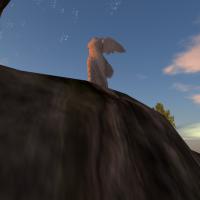The topic is faith, and I’m not talking about religion or trust. Trust is sort of going with the flow, and accepting your experiences. Accepting that you are who and what you are, and that you see the world as you see it. Faith goes beyond these things. Faith is the grey area in your senses, the fuzzy element to experiences, and the realization that though you might not perceive it clearly, that there is a reality anyway.
Is faith belief? No, people often don’t have faith in belief. They adopt it because it is the families tradition, or for some other reason.
To me, it’s like a level, deep, deep inside you that knows there is a process. Yes, exactly and this is what I’m talking about today. It runs deeper than education, and deeper than analysis although it can be discovered by analysis. In the multifaceted world of yoga (which isn’t just a weird form of exercise), they speak of there being many paths to achieving union, and not really with an outside force. Union is more of a realization that the greater way or higher power is there, even though we can’t grasp it like we can the existence of a house pet. It’s an approach to awareness. Really any religion purports to allow this, and permit you to see the truth of divine order. But the paths as described in the Yoga/Vedic texts are:
- Bhakti; the path of devotion, emotion, transcendent love.
- Gnani; the path of perception, realization, understanding.
- Raja; the path of the ascetic, discipline, simplification.
- Karma; the path of cause and affect, experience, action/consequence and experiment.
I use this as an example, because as I describe them, are there any other paths? They may have different names, but are these four paths too short a list?
On the Kabbala Tree of Life there are 22, and it helps me to think of them. Yes, and three pillars all linking to the central pillar. Faith, to use cabbalistic terms, is the central pillar which is in a sense never fully seen, but always there.
When I think of concepts like mercy, justice, understanding, my faith comes to me. Yes, it’s a realization, not a rationalization. In the case of a partner, you trust your partner when you accept that loyal behaviour is loyalty, but trust is not faith. Trust is in the moment, but it’s moment by moment, and that is as far as trust extends. Moment by moment. If you have faith, then you see that your loyal partner is with you for a reason, and that reason may be beyond your current momentary perception, but it isn’t arrived at by ignoring trust. You won’t arrive at faith by saying “Well, it seems the person is trustworthy“. That’s a judgement and arbitrary. You arrive at faith when you realize that it is something beyond “I’m in love with her” or “I’m in love with him”. That there is a reality even beyond that, and you and they are in it.
You can be in love, and not trust them? Actually yes, though the balance of that is usually unstable.
Is this why women still love an abusive husband? Yes, but faith is beyond abusive relationships, and faith isn’t ignorance.
Then is it foolish to be with them if you can’t trust them, but still love them? Far from it. It’s inclusiveness. It’s saying I trust my perception and this world also, even though my perception can deceive me. Foolishness really only occurs in a denial of faith.
Does faith say that this person is worth another chance, or is that something else? It can, but faith will reveal that person in a total context. Faith will include not only what they say, but where they are and what they are doing.
Buddha: “I cannot be deceived.” Yes, deception occurs only to someone whose state permits deception. Faith doesn’t permit deception.
Your thoughts are welcome. Be well friends.
Travis Saunders
Dragon Intuitive
~science,mysticism,spirituality~

